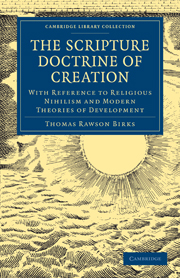 The Scripture Doctrine of Creation
The Scripture Doctrine of Creation Book contents
- Frontmatter
- Contents
- INTRODUCTION
- CHAPTER I ON RELIGIOUS NIHILISM
- CHAPTER II ON RELIGIOUS NIHILISM (continued)
- CHAPTER III THE ALLEGED LAW OF SCIENTIFIC PROGRESS
- CHAPTER IV THE BEGINNING
- CHAPTER V THE CREATION OF MATTER
- CHAPTER VI ON INFINITE SPACE
- CHAPTER VII ON FORCE, LAW, AND NECESSITY
- CHAPTER VIII ON CREATION AND LIFE
- CHAPTER IX ON CREATION AND EVOLUTION
- CHAPTER X EVOLUTION AS AN INDUCTIVE THEORY
- CHAPTER XI ON CREATION BY LAW
- CONCLUSION
CHAPTER IX - ON CREATION AND EVOLUTION
Published online by Cambridge University Press: 29 August 2010
- Frontmatter
- Contents
- INTRODUCTION
- CHAPTER I ON RELIGIOUS NIHILISM
- CHAPTER II ON RELIGIOUS NIHILISM (continued)
- CHAPTER III THE ALLEGED LAW OF SCIENTIFIC PROGRESS
- CHAPTER IV THE BEGINNING
- CHAPTER V THE CREATION OF MATTER
- CHAPTER VI ON INFINITE SPACE
- CHAPTER VII ON FORCE, LAW, AND NECESSITY
- CHAPTER VIII ON CREATION AND LIFE
- CHAPTER IX ON CREATION AND EVOLUTION
- CHAPTER X EVOLUTION AS AN INDUCTIVE THEORY
- CHAPTER XI ON CREATION BY LAW
- CONCLUSION
Summary
The doctrine of Creation, received by the whole Christian Church, and all Christian philosophers of later times, and confirmed by the testimony of Moses and the Prophets, of Christ and His Apostles, is cast aside with contempt by modern Positivism, and has been denounced in the following terms:—
“The belief in special creations of organisms is a belief that arose among men during the era of profoundest darkness, and belongs to a family of beliefs which have nearly all died out, as enlightenment has increased. It is without a solitary established fact on which to stand, and when the attempt is made to put it into definite shape, it turns out to be only a pseudo-idea. The mere verbal hypothesis, which men idly accept as real or thinkable, is of the same nature as would be one based on a day's observation of human life, that each man or woman was specially created, an hypothesis not suggested by evidence, but by lack of evidence, formulating absolute ignorance into a semblance of positive knowledge. This hypothesis, wholly without support, essentially inconceivable, and thus failing to satisfy men's intellectual need, fails also to satisfy their moral sentiment. It is quite inconsistent with those conceptions of the divine nature which they profess to entertain. If infinite power was to be demonstrated, then either by the special creation of individuals, or the producetion of species after a method akin to that of individuals, it would be better demonstrated than by the two methods the hypothesis assumes to be necessary.
- Type
- Chapter
- Information
- The Scripture Doctrine of CreationWith Reference to Religious Nihilism and Modern Theories of Development, pp. 188 - 222Publisher: Cambridge University PressPrint publication year: 2009First published in: 1872


